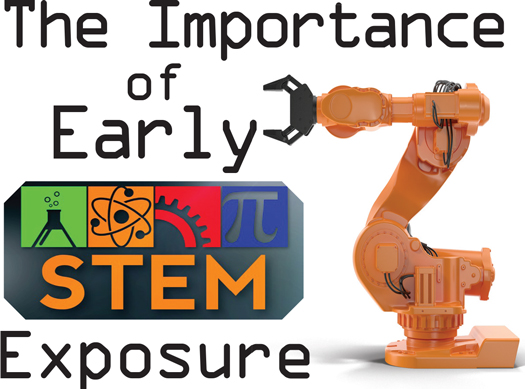The Importance Of Early STEM Exposure
By Khalliday Muhammad | Last updated: Jul 3, 2017 - 7:06:19 PMWhat's your opinion on this article?

|
The basic principle for raising our children is to give them opportunities to make a better life for themselves. Most of us believe once they have had a decent public school education their future will be at the palm of their hands. However, considering the hours students spend away from their parents, there is a possibility they are not given the necessary skills for a college education. No matter their future occupation, STEM skills are an important aspect for developing a community. Therefore, there are some things we need to know about how much exposure our children need when it comes to their education.
What is STEM?
Science, Technology, Engineering, and Mathematics go back centuries from today; moreover, these fields comprise imperative aspects of building homes, finding solutions to diseases, and ultimately creating better communities. Most public schools adhere to requiring students to learn science and math skills, however, there are many students who require more within these fields to further their abilities in their future endeavors. For example, one student may see a future in law and pass on the opportunity to explore STEM, ignoring that the future is pushing towards STEM itself.

|
Are there any economic opportunities for students?
“During the next decade, the United States’ demand for scientists and engineers is expected to increase at four times the rate for all other occupations,” says the STEM Career Organization. Considering this demand, there is a greater expectation for higher pay amongst STEM graduates. In fact, there are many positions in the STEM marketplace that are not fulfilled because students seldom graduate with a STEM degree. Knowing this, if our students were to admire a STEM field at an early age, the same students would be more affiliated with their field allowing them to succeed in their college courses.
How is this good for our community?
The knowledge this generation has about STEM would benefit our own understanding on how to frugally own our businesses, work on our own buildings, and bring money back into our communities. By owning our community and the businesses we support within it, profit would stay in our community allowing us to rebuild our run-down houses, clean up the trash people leave in our streets, and generally run a successful Black community. When it comes to children and young adults, giving them opportunity to join STEM summer clubs would give them more time to figure out what their passions are before they walk across the stage to receive their high school diplomas. Establishing STEM workshops within our community will build our pride knowing we have opportunities for our children that we created ourselves. STEM programs and clubs will keep some students out of trouble, making time for academic and social exposure. Ultimately, the ones you associate with will have similar character. Allowing students to interact through successful educational programs will build a stronger and more intellectual youth population in our community.

|
Why should children be exposed so early?
It is known that learning a new language during childhood and adolescence is much easier than learning during adulthood. Many adult prefrontal cortex, an area where developing memory is stored, are more developed than children because of the experiences they have already gone through, making little room for a faster learning process. Children tend to not see things as exact and straightforward, allowing them to multitask with different learning skills—auditory, kinesthetic, and visual. Therefore, the earlier children are exposed to mathematics, French, or even quantum physics, the better they will be equipped in these subjects and more. However, it does not stop there. Never think that children cannot handle courses college students study. Considering the different learning styles developed, some will be able to apply these styles to any subject. For example, if a five-year-old child were to learn Algebra, he may more likely have the skills to learn other subjects, such as mathematics and architecture, as he grows older. Therefore, it is important that we establish early learning in our homes.
How can we get started?
It is as simple as handing your child a science book or reading one while you are pregnant. However, some students who have passed a certain age would require further exposure. There are many STEM clubs and programs, such as summer camps on STEM college campuses, school robotics clubs, STEM mentoring, and more. Nevertheless, as a community, we can create our own programs making it impossible for any child to be denied admission in a STEM camp. The earlier we reach out to our youth, the more prepared they will be bringing knowledge back into our communities.
INSIDE STORIES AND REVIEWS
-
-
About Harriett ... and the Negro Hollywood Road Show
By Rabiah Muhammad, Guest Columnist » Full Story -
Skepticism greets Jay-Z, NFL talk of inspiring change
By Bryan 18X Crawford and Richard B. Muhammad The Final Call Newspaper @TheFinalCall » Full Story -
The painful problem of Black girls and suicide
By Charlene Muhammad -National Correspondent- » Full Story -
Exploitation of Innocence - Report: Perceptions, policies hurting Black girls
By Charlene Muhammad -National Correspondent- » Full Story -
Big Ballin: Big ideas fuel a father’s Big Baller Brand and brash business sense
By Bryan Crawford -Contributing Writer- » Full Story






 Click Here Stay Connected!
Click Here Stay Connected!








